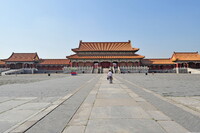| dc.coverage.spatial | Site: Forbidden City (Beijing, Beijing Shi (municipality), China) | en_US |
| dc.coverage.temporal | 1406-1420 (creation); 1644–1911 (alteration) | en_US |
| dc.creator | unknown (Chinese) | en_US |
| dc.date | 1406-1420 | en_US |
| dc.date.accessioned | 2013-08-07T18:20:05Z | |
| dc.date.available | 2013-08-07T18:20:05Z | |
| dc.date.issued | 1406-1420 | en_US |
| dc.identifier | 229441 | en_US |
| dc.identifier.other | archrefid: 2346 | en_US |
| dc.identifier.uri | http://hdl.handle.net/1721.3/137225 | |
| dc.description | North flank of the gate, looking south; The Forbidden City was the Chinese imperial palace from the Ming Dynasty to the end of the Qing Dynasty. Beyond the courtyard of the Meridian Gate stands the Gate of Supreme Harmony (Taihe men), the largest free-standing gate in the Forbidden City; it leads to the imposing, three-tiered marble terrace on which stand the three main ceremonial halls, arranged in the I-shaped gong plan. In addition to monumental stairways, a carved central ramp--the imperial carriageway over which the emperor was carried in a sedan chair--leads up to the top of the Dragon Pavement terrace. The ramp is carved with the imperial motifs of dragons chasing pearls amid clouds, mountains and seas.
Source: Grove Art Online; http://www.oxfordartonline.com/ (accessed 5/10/2011) | en_US |
| dc.format.medium | brick; stucco; tile; painted wood | en_US |
| dc.rights | © Scott Gilchrist, Archivision, Inc. | en_US |
| dc.subject | architecture | en_US |
| dc.subject | decorative arts | en_US |
| dc.subject | historical | en_US |
| dc.subject | rulers and leaders | en_US |
| dc.subject | Chinese | en_US |
| dc.subject | Ming | en_US |
| dc.subject | Qing | en_US |
| dc.title | Forbidden City: Gate of Supreme Harmony (Taihe Men) | en_US |
| dc.title.alternative | Gate of Supreme Harmony (Taihemen) | en_US |
| dc.title.alternative | 太和门 | en_US |
| dc.type | image | en_US |
| dc.rights.access | Licensed for educational and research use by the MIT community only | en_US |
| dc.identifier.vendorcode | 1A2-CH-B-FC-HSH-A29 | en_US |
| vra.culturalContext | Chinese | en_US |
| vra.technique | carving (processes), construction (assembling), painting and painting techniques | en_US |
| vra.worktype | historic site | en_US |
| vra.worktype | gatehouse | en_US |
| vra.worktype | capital city | en_US |
| dc.contributor.display | unknown (Chinese) | en_US |


